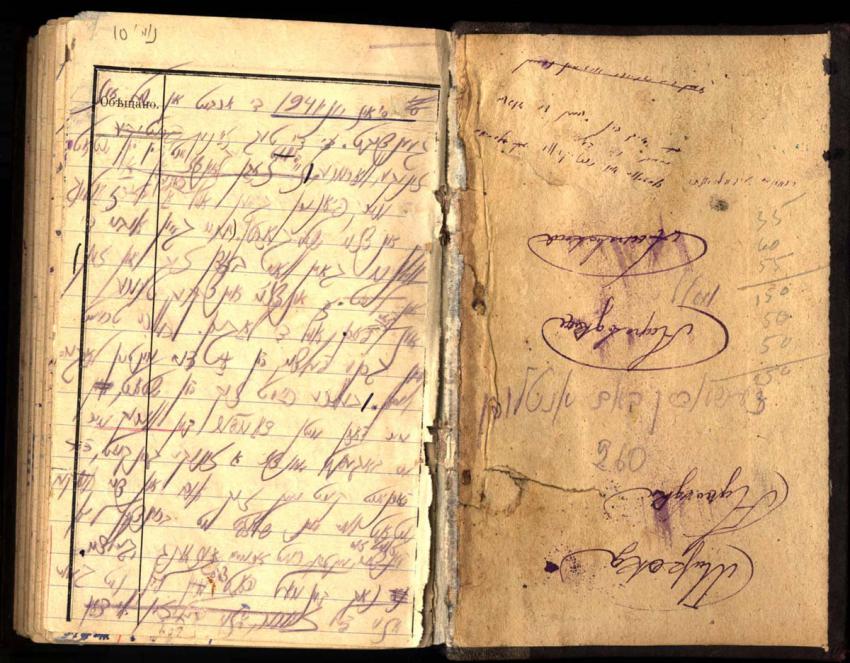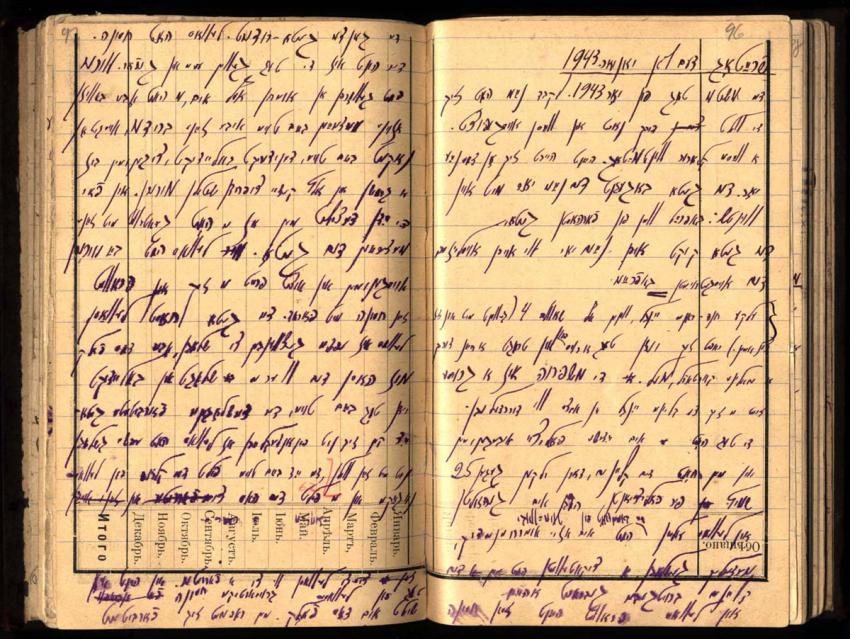Yitzchak was an only child of the Rudashevski family, that settled in Vilna at the beginning of the 1920s. His father, Eliyahu, worked in a publishing house, and his mother, Rosa, was a seamstress. Yitzchak had a normal childhood whose family was influential, enlightened and educated. He was a talented young man who revealed unique issues in the fields of history and literature. He was a member of the Soviet youth movement and was considered a true “pioneer.” In June 1941, when the German army conquered Vilna, he was not yet 14 years old.
The Story
The first entry in his diary is dated June 1941, the month that Vilna was conquered, and the last entry is dated April 7, 1943. The assumption is that until September 1942, Yitzchak wrote about events after they occurred, and only from this date forward did he begin to write about events as they occurred. From the diary we learn that Yitzchak had a gift for language, was sensitive to the world around him, and understood reality. In poetic and sensitive language, he describes experiences, anxiety, amazement, and wishes of an adolescent in the ghetto. The diary is written in Yiddish on 204 pages of a small notebook, some in pencil and some in pen. The diary enables us to glance into the world and the lives of the struggling Jews in the ghetto, where the fear of death reigned. This is how Yitzchak describes his first day in the ghetto to which he was confined in September 1941:
“The first ghetto day begins. I run right into the street. The little streets are still full of a restless mass of people. It is hard to push your way through. I feel as if I were in a box. There is no air to breathe. Wherever you go you encounter a gate that hems you in. We drift to the gate which divides us from Strashun and I find relatives and acquaintances. Many of the people no longer have places to live in. They settle down on stairs, in stores…I decide to hunt up my friends in the courtyard. I have an idea that all of us will be there.”
Yitzchak understood that in order to survive there would be a need for social organization and cooperation. This insight indicates a concern that grew out of loneliness, which he describes in his diary several pages before this: “We are so sad, so lonely. We are exposed to mockery and humiliation.”
The writing of diaries during the Holocaust was not a rare occurrence. We know from other diaries written during this period, that keeping a diary stemmed from many factors: the desire to leave testimony; a type of internal conversation between the writer and himself which served as a remedy for the soul; a way to deal with dangers and loneliness.
Reading Yitzchak’s diary enables the reader to glance outside of the Vilna Ghetto walls and to experience the everyday life from the unique perspective of a young adult. The diary provides us the opportunity to uncover the emotional complexities of a young adult who was forced to grow up within the ghetto walls. The harsh reality in the ghetto undermined the normative family structure; many children were involved in the livelihood and the support of the household, watching over younger siblings, cooking and cleaning.
Frequently, children found themselves as the sole people responsible for the care of the family, and were often forced to smuggle food and other necessities into the ghetto. Yitzchak was also responsible for jobs that were largely those of adults:
“Life has gradually begun to “return to normal.” The handful of surviving Jews has begun to become accustomed to the new conditions. My parents work and I have become the “mistress” in the house. I have learned to cook, to wash floors, and on this I spend my days. In the evening I go to meet my parents.”
Although the heavy responsibility fell on him, Yitzchak did not relinquish his inner social world as a growing teenager. His love for the youth movement and its activities, together with his belief in the definite victory of the Red Army over the Nazis, is evident in his diary. Yitzchak was involved in clubs for literature, poetry and history, and recognized that these gave him immense joy – he received compliments and praises for the texts that he wrote and read to his friends. Similarly, he was party to the documentation of daily life in the ghetto; he volunteered to interview residents of the ghetto and write their testimonies. Yitzchak saw this as valuable for the future:
“In our group two important and interesting things were decided. We create the following sections in our literary group: Yiddish poetry, and what is most important, a section that is to engage in collecting ghetto folklore. This section interested and attracted me very much…In the ghetto dozens of sayings, ghetto curses and ghetto blessings…even songs jokes, and stories which already sound like legends. I feel that I shall participate zealously in this little circle, because the ghetto folklore which is amazingly cultivated…must be collected and cherished as a treasure for the future.”
As he said, these writings were extremely valuable in Yitzchak’s life. In his diary he tells of the different types of writing that he was engaged in, documentary, literary and poetic, and historical writing in the framework of his activities and those who he met. Among them is the eulogy of his respected teacher, Yaakov Gershteyn, who died in the ghetto. Yitzchak also wrote eulogies for people whom he loved, among them, his good friend Benkya Naar. The fact that he wrote a diary for himself, teaches us that these were intimate texts, that opposed to other texts in which additional people collaborated, this was not designated for anyone else’s eyes.
Writing a diary in close proximity to an event situates the importance of this event for future readers. The writer tells his story, without outside interference, and provides his interpretation of reality. In this way, Yitzchak’s writing draws from his inner world and represents the reality outside as is formed by his testimony. Yitzchak’s descriptions can change based on his mood at any given moment. For example, his descriptions of the High Holy Days differ and expresses the subjective point of view of the feeling surrounding holidays in the ghetto. Yitzchak writes on Rosh Hashanah (Jewish New Year):
“It is twilight. I go out into the street. The streets are lively. People are walking around dressed up. Today is a holiday. This is evident in every house you enter, the poverty has been scrubbed away. Formerly this would not have made an impression on me. However, now I felt strangely good because the everyday gray day is so much in need of a little holiday spirit which should drive away for a while the gray commonplaceness of life. People walked around until late on the little Vilna ghetto streets. A strangely sad holiday mood. And now the crowds thin out more and more. A cold starry sky overhead.”
This description teaches us that despite the difficult daily struggle in the ghetto, residents of the ghetto were successful in maintaining their inner spirit. On the contrary, on Yom Kippur (Day of Atonement), Yitzchak describes the holiday in a nostalgic tone, as a day he fondly remembers, that shadows the difficult aura that existed in the home and on the streets:
“It is Yom Kippur Eve. A sad mood suffuses the ghetto. People have such a sad High Holy Day feeling. I am as far from religion now as before the ghetto. Nevertheless, this holiday is drenched in blood and sorrow which is solemnized in the ghetto, now penetrates my heart. In the evening I felt so sad at heart. People sit at home and weep. They remind themselves of the past…Drenching each other with tears as they embrace…I run out into the streets and there it is also the same: sorrow flows over the little streets, the ghetto is drenched in tears. The hearts which have turned to stone in the grip of ghetto woes and did not have time to weep their fill have now in this evening of lamentation poured out all their bitterness…The evening was dreary and darkly sad for me.”
After the evacuation of the Vilna Ghetto on September 23, 1943, Yitzchak, his family and his uncle’s family, went into hiding. Approximately two weeks later, their hiding place was discovered and during the High Holidays of that year, they were all taken to Ponar, where they were murdered in mass graves.
Sarah Voloshin, Yitzchak’s cousin, was the only one who managed to escape. She became a member of the Partisans and participated in the liberation of Vilna, where she came across the family’s hiding place and found the diary. The discovery and exposure of the diary gave such materials a new role in the field of first-hand documentation.
Today, the original diary is kept at YIVO in New York (an institute established in Vilna in the 1920s for the research of Yiddish) and copies of the diary are in other archives, including the archive at Yad Vashem.
Points for Discussion
- Yitzchak, who never stopped testing himself and his difficult reality, wrote on his fifteenth birthday from within the ghetto: “Wednesday the 10th of December. It dawned on me that today is my birthday. Today I became 15 years old. You hardly realize how time flies. It, the time, runs ahead unnoticed and presently we realize, as I did today, for example, and discover that days and months go by, that the ghetto is not a painful, squirming moment of a dream which constantly disappears, but is a large swamp in which we lose our days and weeks…In my daily ghetto life it seems to me that I live normally but often I have deep qualms. Surely I could have lived better. Must I day in day out see the walled-up ghetto gate, must I in my best years see only the one little street, the few stuffy courtyards?”
- Sarah Voloshin, Yitzchak’s cousin, testified that the family knew about the diary, even though Yitzchak preferred to keep it to himself, and it seems that no one read it until the diary was found after the war. What is the meaning of writing a diary in the ghetto? In your opinion, what was Yitzchak’s purpose in writing it?
- There are those who saw the writing of a diary as a clear instrument of testimony and there are others who saw it as “writing for the drawer.” With time and further research, the importance of understanding daily life in the ghetto has broadened. What is the importance of diaries that were written during the Holocaust? Even when the diary was intended to be personal and kept in a drawer, in the war’s aftermath it has turned into an historical document. Why?
- Yitzchak differentiated between writing a personal diary and his work on keeping testimony. What are the differences between documented writing and intimate writing?
- How is the writing of a diary in the ghetto as defiance against the Nazis?










